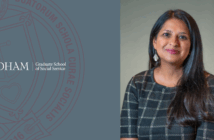Social workers are caregivers and changemakers, and often throw themselves into their work. They do this because they know it’s for the betterment of their community and society. When a client makes a breakthrough, or a policy gets passed—these moments remind professionals why it’s all worth it.
Sometimes, however, those moments can be few and far between. Day after day, those on the frontlines tackle issues head-on with their entire selves—but it seems like the results will never come. What comes instead is frustration—with the system, society, and themselves.
Fordham GSS adjunct professor Mary Powell, Ph.D., LCSW, would describe this feeling as burnout. In her new book, Burnout in Social Work Field Education: Mitigating the Risk, she identifies that burnout is not exclusive to practicing social workers. Master of Social Work (M.S.W.) and bachelors students can feel it, too. But with some effort, things can change.
Burnout provides a detailed description of Powell’s research results on social work student burnout. It serves as a resource for social work students, faculty, and administrators to understand the causes of burnout in social work students, and provides a framework for implementing change within the organizations to lessen burnout’s impact.
We sat down with Powell to discuss burnout, why students feel it, and how those frameworks can lead to solutions.
The Three Factors that Cause Burnout in Social Work Students
Powell began researching this topic as a doctoral student in Fordham’s Ph.D. program. While many studies had explored professional social work burnout, Powell realized that there was a gap in the research—social work students. Her doctoral dissertation analyzed the burnout levels of 203 Fordham M.S.W. students participating in field education. Powell measured burnout using the Maslach Burnout Inventory (MBI), which determines burnout by three factors:
- Emotional Exhaustion measures feelings of being emotionally overextended and exhausted by one’s work.
- Depersonalization measures an unfeeling and impersonal response toward recipients of one’s service, care treatment, or instruction.
- Personal Accomplishment measures feelings of competence and successful achievement in one’s work.
Powell’s study also explored two other subjects that added to the students’ measured burnout levels—role ambiguity and coping strategies.
Role Ambiguity
Powell defines role ambiguity as a lack of clarity in one’s position. In this case, the role pertained to the students’ field education internships.
“[There were] virtually hundreds of studies on role ambiguity in practicing social workers, but there was nothing on students,” Powell said. “For me, this was unacceptable.”
Powell’s study revealed that students facing role ambiguity were significantly more likely to experience burnout than those with clear roles in their field placements.
Coping Strategies
The study also examined two student coping strategies—problem-focused and emotion-focused. Powell described problem-focused coping as a logical, “let’s fix this” strategy, while emotion-focused coping is, by nature, more emotional.
Traditionally, Powell said, professional social workers experienced less burnout when utilizing problem-focused coping strategies. Contrastingly, practicing social workers who relied on emotion-focused coping reported higher levels of burnout.
Social work students reported the exact opposite. Those who used emotion-coping reported fewer burnout symptoms than those who were problem-focused.
“[One reason for why this is, is that students are] only going be in their internship for a year or two,” Powell said. “They can say, Oh, I’ll just look at the positives, because they’re going to be done—whereas with practicing social workers, that’s not the case.”
Age’s Influence on Burnout
Age also played a factor in Powell’s findings. Results showed that younger students reported feeling more burned out than older students.
This data trend is particularly tricky—because both sides are understandable. On the one hand, one might think older students—more likely to have children, careers, and other responsibilities—should experience more burnout as they try to juggle it all. On the other hand, younger students entering a master’s program right after college may not have the confidence that tends to come with life experience—and thus burn themselves out with self-imposed pressure for perfection. This is just one hypothesis among many.
“I thought [it]was crazy, because it’s like, over time, don’t you get burned out?” Powell said.
Change Starts and Ends with Organizations
The world needs social workers in so many contexts. Society’s most vulnerable populations rely on the profession to help them during their most difficult times. But how do we help social workers, starting at the very beginning of their careers when they are students?
Some would say to begin with self-care. Meditation, exercise, nutrition—these are all staples of an effective self-care routine, and they can certainly help. Powell said that, before this research, she also thought routine self-care was the answer. It helps, Powell said, but it’s not the solution.
“Self-care is not going to cure burnout,” Powell said. “It might for the moment, but it won’t solve the long-term problem.”
Powell wants to see an intentional approach by universities to make organizational shifts that prevent student burnout. This can include additional emotional support and more field placement supervision sessions.
“The schools care about the students, their well-being, and their burnout. I have no doubt about that,” Powell said. “[But] we can’t just focus on self-care. We have to look at the organization.”
Before the start of this academic year, Fordham GSS reduced the M.S.W. field education hour requirement from 950 to 900 hours. Powell thinks this was a major step in the right direction.
“I was so happy to hear that,” she said.
At the same time, Powell believes fewer hours do not necessarily equal less burnout. It is a step in the right direction, but other areas need attention.
Powell said if there is one message to receive from her new book, it’s that self-care is not sufficient. And that’s not just her opinion—there’s research to back it up. So, if social work wants to mitigate burnout in the profession, it must start with its students, and the change needs to be organization-wide. These changes will lead to more effective and impactful professionals.
“If we’re not burned out by our environment, it’s going to help the client,” Powell said. “If we’re burned out, clients will at least unconsciously pick that up.”
Powell hopes her research will help schools of social work and partnering agencies in their efforts to support students while also educating social work students to be aware of those factors that might affect their performance as they prepare for professional practice.



